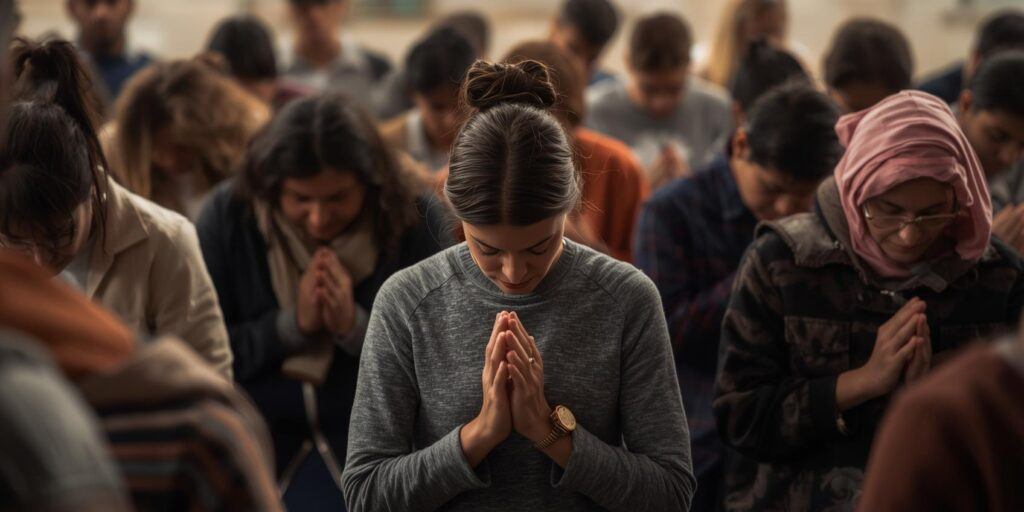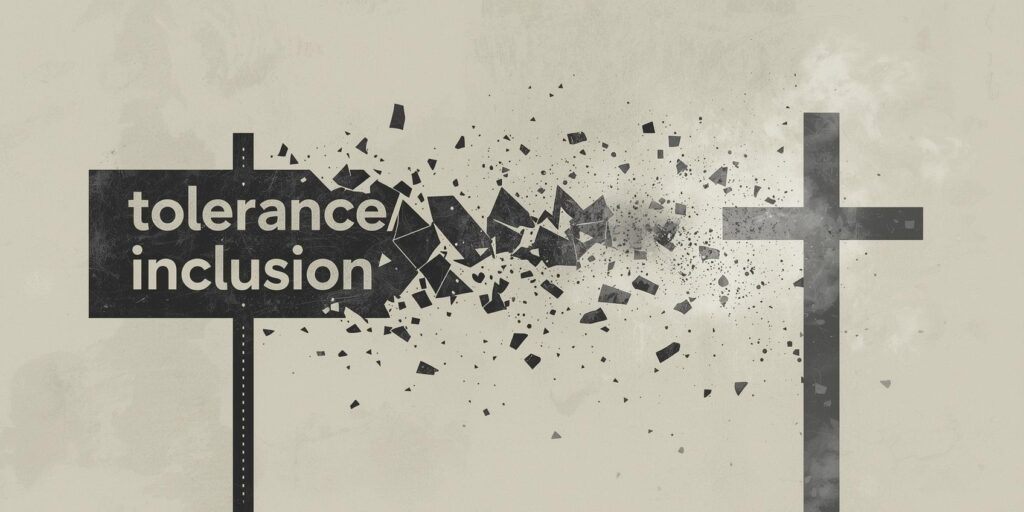A Heavy Week of Grief

My heart has been heavy all week since the tragic loss of Charlie Kirk. His life ended abruptly on a stage where he had gone, once again, to share bold convictions and invite open dialogue.
Like so many, I’ve wrestled with grief, frustration, and yes, anger. My flesh cries out for justice, even vengeance. But I am reminded that justice ultimately belongs to God, and that Jesus calls us to respond in a way that confounds the world — with faith, not fury. This reflection is not a political rant. It is a tribute to Charlie’s life, a defense of his heart, and a call for believers to live out the difference Christ makes in how we grieve and respond.
Honoring Charlie Kirk’s Life and Heart
Charlie was a passionate man of conviction, never shy about taking unpopular stands. Whether speaking on college campuses, engaging on social media, or through the movement he founded with Turning Point USA, he challenged the status quo with ideas rooted in truth as he understood it. He didn’t whisper his convictions — he declared them boldly, even when it cost him friends, opportunities, or favor in the public eye.
Even his critics admitted he was a figure who stirred passion. Some loved him, some opposed him, but very few could ignore him. What often went unseen, however, was the heart behind that boldness: a man driven not by hate, but by faith. Charlie was motivated by conviction, by the desire to equip a rising generation to think critically, and by the belief that courage matters in a culture drowning in confusion.
Those who knew him best describe a man who believed deeply in dialogue — not because he wanted applause, but because he believed truth could stand on its own. He was willing to sit on stages and take the heat of opposition, to give space for debate and disagreement, because he valued the power of open conversation in a free society.
In his final moments, Charlie was doing what he had always done: inviting dialogue, creating space for others to speak, and expressing his views openly. He did not call for violence. He did not incite hatred. He sought engagement. That matters, because it shows that his legacy was not one of weapons or war, but of words, ideas, and convictions.
And that may be one of the clearest ways to honor him: to remember that truth does not need violence to defend it. Charlie’s weapon was his voice. His shield was his faith. His legacy is not fear, but courage.

Grace Under Fire – How His Side Responded
In the wake of his death, what has struck me most is how Charlie’s family, friends, and community responded. In a moment when anger and retaliation would have been the world’s natural response, they chose a different path.
His wife, Erika, stood at the center of unimaginable grief and yet lifted her voice in strength. Instead of collapsing into silence, she turned her sorrow into resolve, calling her cries “a battle cry.” She pledged to continue the mission Charlie began — not with bitterness, but with boldness. That kind of courage can only be born from deep faith.
Charlie’s colleagues and supporters gathered not in riots, but in prayer meetings and vigils. They lit candles instead of fires. They raised their hands in worship instead of raising fists in violence. They wept, yes, but they wept before the throne of God, trusting Him to carry what they could not.
This response speaks volumes. For years, Charlie’s side of the aisle has been accused of hatred and intolerance. Yet, in their darkest hour, they displayed dignity, peace, and faith. No broken windows. No burned businesses. No violence in the streets. Just the quiet, powerful witness of a people who know where their hope lies.
And that is exactly the kind of testimony Charlie would have been proud of. He stood boldly, but he also believed in responding to darkness with light. His legacy is not just in the words he spoke, but in how his family and community now live out those words. They remind the world that the truest strength is not found in revenge, but in restraint. Not in hatred, but in hope. Not in chaos, but in Christ.

The Painful Hypocrisy of Celebratory Voices
And yet, as the mourning continued, another response emerged. While Charlie’s family grieved with dignity and his community gathered in prayer, online voices erupted with venom. Some mocked his death. Others openly celebrated it. Many twisted his words to paint him hateful, ignoring the truth that his convictions flowed from faith, not malice.
This is hypocrisy laid bare. The very people who constantly preach diversity, inclusion, and acceptance are too often the same ones who exclude, slander, and even cheer violence when someone dares to hold a different worldview. They speak of “tolerance,” but their tolerance vanishes the moment a voice rises that challenges their narrative. What they call compassion reveals itself as cruelty the instant disagreement appears.
Let’s be clear: since Charlie’s assassination, his community has not rioted or burned cities. His supporters have not looted businesses or destroyed neighborhoods. Instead, they have prayed, grieved, and honored his memory in peace. That is fruit worth noting.
By contrast, history has shown how the other side has responded to past controversies — Antifa’s violence in the streets, the chaos of BLM protests that left communities scarred, riots fueled not by truth but by rage. All in the name of “justice.” But as Jesus said, “By their fruit you will recognize them.” (Matthew 7:16) And time and again, the fruit of their ideology has been destruction, not peace.
The hypocrisy stings even more when you see the double standard applied. A believer’s life is taken, and instead of universal mourning, his death becomes a punchline. But when tragedy strikes their own causes, they demand unquestioning sympathy and silence any dissent. This is not equality. This is not compassion. It is partiality, and Scripture warns against it (James 2:1).
Contrast that with the response to Charlie’s death: prayer gatherings, tributes, moments of silence, and communities leaning on faith instead of fury. One side chose dignity. The other, too often, defaults to rage. And that difference reveals more about the spirit behind each movement than any slogan or hashtag ever could.

What Scripture Teaches About Justice and Mercy
I will not lie — part of me longs for “an eye for an eye.” When I think about the hatred that ended Charlie’s life, my flesh demands retribution. Something in us cries out for balance: They took, so something should be taken in return. That impulse is ancient, and it feels so natural.
But Scripture speaks directly into this tension. Jesus redefined justice in a way that turned the world upside down:
“You have heard that it was said, ‘Eye for eye, and tooth for tooth.’ But I tell you, do not resist an evil person. If anyone slaps you on the right cheek, turn to them the other also.” (Matthew 5:38–39)
And again:
“But I tell you, love your enemies and pray for those who persecute you.” (Matthew 5:44)
These are not easy words. They cut against every natural instinct. They force us to confront the truth that revenge never brings peace. Retaliation only multiplies pain. If violence answered violence, the world would already be consumed by endless war.
Jesus does not excuse evil or minimize grief. He doesn’t ask us to pretend the wrong never happened. Instead, He calls us to entrust justice into the hands of the One who cannot be corrupted, cannot be deceived, and will never overlook wickedness.
Paul echoes this in Romans 12:19:
“Do not take revenge, my dear friends, but leave room for God’s wrath, for it is written: ‘It is mine to avenge; I will repay,’ says the Lord.”
This is both sobering and freeing. It means we can release the crushing weight of vengeance, knowing God will set all things right. It also means that mercy and forgiveness are not weakness — they are acts of radical trust in God’s ultimate justice.
So while my heart aches for fairness, I choose to believe that the Judge of all the earth will do what is right (Genesis 18:25). I choose to pray for Charlie’s family, to cry out for comfort and healing, and to live in a way that testifies to the hope of a kingdom where justice and mercy meet at the cross.
The Cost of Hypocrisy in Our Culture
The rejoicing over Charlie’s death exposes something deeper than political disagreement. It reveals the rot of hypocrisy in our culture.
We live in a time where entire movements wave banners of tolerance, diversity, and inclusion — yet those same voices often erupt in rage when someone dares to disagree. They preach acceptance, but practice exclusion. They celebrate “love,” but applaud when opponents are mocked or destroyed. That isn’t love. That isn’t tolerance. That is hypocrisy.
We’ve seen the fruit of it before. When outrage spills into the streets, it often ends in broken windows, burned businesses, and devastated communities. All in the name of “justice.” But Scripture reminds us that you can judge a tree by its fruit (Matthew 7:16). If the fruit is anger, violence, and destruction, the root is not truth but deception.
By contrast, look at the response of Charlie’s family and community: grief, prayer, dignity. They chose not to riot or lash out, but to honor his memory in peace. That difference is staggering. One side preaches peace but sows chaos. The other is accused of hatred, yet in their deepest pain, they turned to prayer.
Jesus warned us of this very thing:
“Because of the increase of wickedness, the love of most will grow cold.” (Matthew 24:12)
This is the cost of hypocrisy in our culture: a love grown cold, a society that calls evil good and good evil, a generation that claims compassion but cheers at the suffering of its opponents. The death of Charlie Kirk has become a mirror, showing us how far the world has drifted from genuine love and truth.
But here’s the hope: hypocrisy cannot last forever. Lies collapse under the weight of truth. Darkness trembles before the light. And while our culture grows colder, the Church is called to grow warmer, stronger, and bolder — a living testimony that Christ’s way is different.

They Tried to Silence Him, But His Voice Multiplied
Those who pulled the trigger thought they could silence Charlie Kirk. They believed that by ending his life, they could end his influence. But what they didn’t understand is that truth does not die with the messenger. The grave has never been able to hold back the power of conviction.
In fact, Charlie’s voice echoes louder now, carried in the hearts of those who refuse to be intimidated into silence. His death has not muted his message — it has amplified it. What was once the voice of one man has become a chorus.
Instead of fear, his passing has stirred courage. Instead of silence, it has awakened conviction. They tried to take down one man, but in doing so they woke up a million new Charlie Kirks — ordinary people, students, families, pastors, and neighbors who see the cost of standing for truth and have resolved to do it anyway.
This is not a new story. History shows that when darkness tries to snuff out light, the flame spreads instead of dying. The early church grew under persecution. The blood of martyrs became the seed of the gospel. And today, Charlie’s death serves as a sobering reminder that those who live boldly for truth may pay the ultimate price, but their message cannot be killed.
Yes, my heart still burns with anger. I want justice. Part of me wants revenge. But Jesus reminds me that vengeance belongs to God. The cross was the ultimate example — the world thought it silenced the Son of God, but the resurrection turned death into victory.
“What you meant for evil, God meant for good, to bring it about that many people should be kept alive.” (Genesis 50:20)
So we take up the mantle — not to riot, not to burn, not to repay violence with violence — but to speak, to pray, to live boldly for Christ. If Charlie’s voice is gone, let ours multiply. If they tried to extinguish the flame, let it become a wildfire of faith, truth, and courage across this nation.
“The light shines in the darkness, and the darkness has not overcome it.” (John 1:5)

A Christian Response to Violence and Division
So how do we, as believers, respond in moments like this? The temptation is to let grief harden into bitterness, or anger flare into retaliation. But Christ calls us to something higher — a witness that reflects His kingdom, not the world’s brokenness.
We grieve with hope. It is right to mourn. Tears are holy, and Jesus Himself wept at the tomb of His friend Lazarus. But as Paul reminds us, “we do not mourn as those who have no hope” (1 Thessalonians 4:13). Our grief is anchored in the promise of resurrection and the assurance that this story is not the end.
We pray for Charlie’s family. His wife Erika and their young children need a strength beyond human capacity. In prayer, we lift them before the God of all comfort (2 Corinthians 1:3–4), asking Him to surround them with peace that passes understanding, to provide for their needs, and to hold them close in His everlasting arms.
We call out hypocrisy without becoming hypocrites ourselves. It is not wrong to name evil for what it is, or to shine light on the lies of a culture that preaches love but celebrates death. Yet as Paul warns in Ephesians 4:26, “In your anger do not sin.” We can expose the contradictions of this world without letting our own hearts be poisoned by hatred.
We choose faith over fury. Just as Charlie’s community has done, we choose to answer hatred with dignity, and violence with peace. This is not weakness — it is the strength of Christ displayed through us. As Romans 12:21 says, “Do not be overcome by evil, but overcome evil with good.”
This is the path Charlie would have wanted his legacy to inspire. To stand boldly for truth, but to stand in a way that points people to Christ. To endure persecution not with vengeance, but with steadfastness. To be people who carry both conviction and compassion in equal measure.
The world may not understand it. To them, it looks like surrender. But in reality, it is victory — the kind of victory that cannot be stolen by bullets, lies, or hate.
Closing Reflection & Prayer
Charlie Kirk’s legacy is one of faith, courage, and conviction. He was not perfect, but he stood boldly and left an example of responding to adversity with words, not weapons.
As believers, our calling is to honor that legacy not just in memory but in action. To live with faith, to discern with wisdom, and to stand firm in a world that often despises truth.
Prayer:
Heavenly Father, we lift up Charlie’s family. Surround them with Your comfort, heal their wounds, and give them strength. We pray for our nation, so divided and deceived — let truth prevail and let Your justice roll down like waters. And we pray for our own hearts, that anger would not master us, but that we would reflect Christ in all things. In Jesus’ name, Amen.
